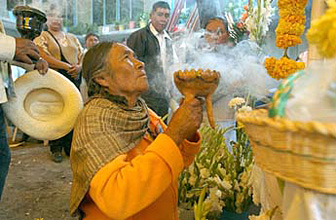 |
 |
 |
 Editorials | Issues | May 2007 Editorials | Issues | May 2007  
Language at Heart of Cultural Fight in Mexico
 Hector Tobar & Cecilia Sanchez - LATimes Hector Tobar & Cecilia Sanchez - LATimes


| | Copal incense burns as a villager worships in El Nith. The Hnahnu long ago mixed Catholic beliefs with their own. |
The daughter born to Cesar Cruz Benitez and Marisela Rivas has no official name. Which is rather strange considering the girl is almost 2 years old.

Her parents live in Tepeji del Rio, a town in an arid corner of Hidalgo state north of Mexico City. Speakers of the indigenous language Hnahnu, they call their little girl Doni Zänä, or "flower of the moon" in Hnahnu.

But Cruz's attempts to register the baby name with the authorities have been rebuffed. The state's computers, officials say, don't accommodate the characters - including an underscore - that represent the distinctive sounds of the Hnahnu language.

For Cruz and other Hnahnu, the case has become a human rights issue highlighting what they say is discrimination against their people, an indigenous group of several thousand people in central Mexico. To some outsiders they are known as the Otomi, a name given to them by Spanish conquistadors five centuries ago.

"My daughter doesn't have a name yet, but I'm not going to give up," Cruz, an artisan, said in a telephone interview. "If necessary, I'll go to the international organizations to help me."

Like Cruz and his wife, three of their four other daughters have official names not from the Hnahnu language. The girls are Jocelyn, Perla and Antonia.

But in Hidalgo, as in other corners of Latin America, indigenous pride is growing. And the Cruz-Rivas family has been looking to embrace the language of their ancestors.

"This isn't some whim of mine," Cruz said. "This has become a struggle to preserve our traditions, our culture and our language. ... I don't know why it's so hard for them to understand and respect our customs."

Cruz said members of his community are often pressured to change the names of their children to Spanish names, or at least something that sounds more Spanish. Often, he said, the pressure comes with an ethnic slur.

When Cruz's sister went to register her son's indigenous name, she too was rejected, he said.

"They told her at the registry that those names weren't allowed because they were Indian names," Cruz said. "They recommended another name - Alfred. That's a foreign name. So that boy is indigenous but he's now called Alfred."

Hidalgo officials said the problem is related to the computer system installed when the state retooled its information technology in 1999 to guard against the so-called millennium bug. The new system, used to produce identity cards, won't accept characters outside the Spanish alphabet.

"The two dots over the A's and the underscore ... won't go through the computer," Jose Antonio Bulos, director of the State Family Registry in Hidalgo, told the Mexico City newspaper Reforma.

"That means the child won't be able to get a Unique Population Registration Code," the equivalent of a Social Security number, Bulos said. The code is derived, in part, from the first letters of a person's given name and surname.

The case has been taken up by the Human Rights Commission of Hidalgo.

"We believe that it's the right of the parents to give their daughter the name they want," said commission spokesman Fernando Hidalgo Vergara.

The commission is pushing the state to update its computers.

Cruz has won one battle with state officials. He has a daughter called Yohoki, which means "rebirth." At first, state officials rejected the name because they thought it was "Japanese."

"They really are ignorant," Cruz said.

State officials suggested to Cruz that he simply drop the two dots and the underscore from Doni Zänä's name on official documents. But if he did so, the name would no longer mean "flower of the moon" in Hnahnu, he said. Instead, it would be "it is a rock" and "here bite."

"Of course, we don't want that," Cruz said.


| • R E A D E R S ' C O M M E N T S •
 | 
|

I am from the Otomi community from the Municipal Districts of Allende and Dolores Hidalgo of the state of Guanajuato. We are from the same ethnic group as the girl, Doni Zänä. Thank you for printing your article and presenting us in a positive manera. You can go closer to the source of this article by going to www.tulahidalgo.com/node/1115. This is the newspaper that is from the same state of Hidalgo as Doni Zänä.

Sincerely, Carlos García

Our thanks to Sr. García for corrections made to the original article. -BN | 
 | |
 |



